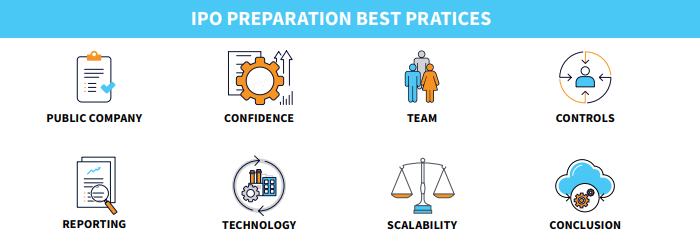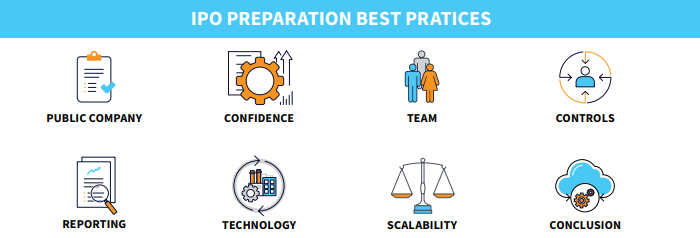True Cost of Ownership: Transitioning an Older ERP System to Acumatica
The Costs and Benefits of Replacing Your Older ERP System In today's rapidly evolving business landscape, upgrading from an outdated legacy system to...
4 min read
 Murray Quibell
Sep 19, 2023 10:32:02 AM
Murray Quibell
Sep 19, 2023 10:32:02 AM

As you transition from evaluating your preparedness to entering the IPO planning and preparation phase, addressing significant inquiries about your financial data and past performance becomes crucial.

More and more Canadian companies from various industries actively seek opportunities to raise capital in the thriving U.S. markets. One popular avenue they explore is by cross-listing on esteemed U.S. stock exchanges like NYSE or Nasdaq and complying with the U.S./Canada multijurisdictional disclosure system (MJDS) by registering with the U.S. Securities and Exchange Commission (SEC).
There are numerous benefits for Canadian companies considering cross-listing on a U.S. stock exchange. One of these advantages is the potential to expand their capital raising options. By cross-listing, Canadian companies can make their securities more accessible to U.S. investors, opening up the opportunity to reach a broader investor base. Additionally, cross-listing provides greater flexibility in offering equity-based compensation to U.S. employees and may even enhance the appeal of issuing equity for the acquisition of U.S. companies.
Before embarking on this journey south of the border and relying on the MJDS, Canadian companies must carefully consider a few key factors.
Launching a successful initial public offering (IPO) is a meticulous process that requires years of careful planning and preparation. It's about more than just filing the necessary documents and going public; companies face many challenges even after the IPO. Once listed on prestigious stock exchanges like the AMEX, NYSE, or NASDAQ, companies are thrust into a new world with escalating demands and stringent reporting requirements.
To ensure a smooth transition into the public arena, companies should start adopting the mindset and practices of a public corporation at least 12 to 18 months before their anticipated IPO. This proactive approach allows them to identify and address any potential issues that could hinder the success of their IPO or expose them to non-compliance risks. While financial reporting is undeniably crucial, it should not be the sole focus. Instead, companies should take a holistic approach encompassing all aspects of their organization, including people, processes, and technology.
By adopting this comprehensive approach, companies can navigate the complexities of going public and position themselves for long-term success in the U.S. markets.
Building a resilient and successful business requires strategically placing dedicated subject matter experts in key positions. As your company transitions into a public entity, it becomes crucial to add new functions and diversify your leadership team. Executives with proven experience supporting IPO initiatives and establishing credibility with investors are essential for your company's success. Many organizations opt to bring in executives with deep expertise in IPOs and have established alliances with analysts, banks, attorneys, and regulatory specialists. This external background can bring valuable insights and perspectives beyond what is already present within the business.
In addition to strengthening your executive team, it is equally essential to ensure that your board is filled with members with backgrounds in public company operations and significant experience in corporate governance, performance reporting, and auditing. Research consistently highlights the advantages of diversifying boards and leadership teams across various criteria, including race, age, gender, and leadership style. Government regulators and industry analysts view broadly diverse leadership teams and boards favourably and foster a culture of inclusivity and innovation within your organization.
By prioritizing your executive team's and board's development, you position your company for long-term success in the U.S. markets. Acumatica Cloud ERP, with its real-time access to one version of financial truth and comprehensive 360-degree views of your business, ensures that all leaders are well-informed and equipped to make strategic decisions.
While private companies often seek targeted counsel on their industry and business practices, public companies have an additional need to work closely with various professionals. This includes investment banks, internal and external auditors, sell-side analysts, lawyers, capital market advisors, and regulatory consultants. It is important to start building these relationships early and adjust operations based on their guidance. Consider hiring specialists to support the IPO process and engage others for long-term partnerships.
For instance, you should carefully choose underwriters (investment banks) who can assist in developing registration statements, underwriting risks, and supporting stock sales during and after the IPO. Good underwriters can also support the IPO roadshow, ensuring a successful launch.
Sell-side analysts can be valuable in helping you acquire the right mix of investors for your company. Additionally, your company's attorney must assemble a team of legal specialists, including securities counsel and underwriters counsel, to oversee SEC filings and disclosures. Acumatica Cloud ERP's advanced financial management capabilities can assist in adhering to strict SEC reporting regulations and ensuring full auditability.
By actively engaging with banks, analysts, and advisors, you can leverage their expertise and support to navigate the complexities of going public and maximize the success of your IPO.
Gaining the trust and confidence of underwriters and investors is a crucial step for companies venturing into the challenging path of an IPO. Before they can tap into the potentially rewarding investor pool, they must demonstrate their value to underwriters, analysts, industry influencers, and potential shareholders. This involves showcasing consistent and substantial growth, meeting revenue targets, and convincing stakeholders that they can sustain growth despite market fluctuations. Additionally, they must actively engage in analyst meetings and embark on an impressive IPO roadshow to spread the word about their company's potential.
“We intend to become a leader and an international company, and now we are more efficient in our processes, especially in invoicing and analytics, which allows us to better understand our revenue streams and our outcomes. It was hard to have that granularity with an outside accounting system. Now I have a system that provides me with enough analytics to drive my business and support the way we report.”
– RACHID OUADDOUR, FINANCE MANAGERTRAVELDOO TECHNOLOGIES (AN EXPEDIA INC. COMPANY)
Please visit our related articles below:

The Costs and Benefits of Replacing Your Older ERP System In today's rapidly evolving business landscape, upgrading from an outdated legacy system to...

Acumatica vs Sage 300: Which One is Better for You? When selecting an enterprise resource planning (ERP) system, businesses must consider various...